2019人教版英语九年级全一册教案Unit12SectionB1a1e语文
- 格式:doc
- 大小:20.49 KB
- 文档页数:4
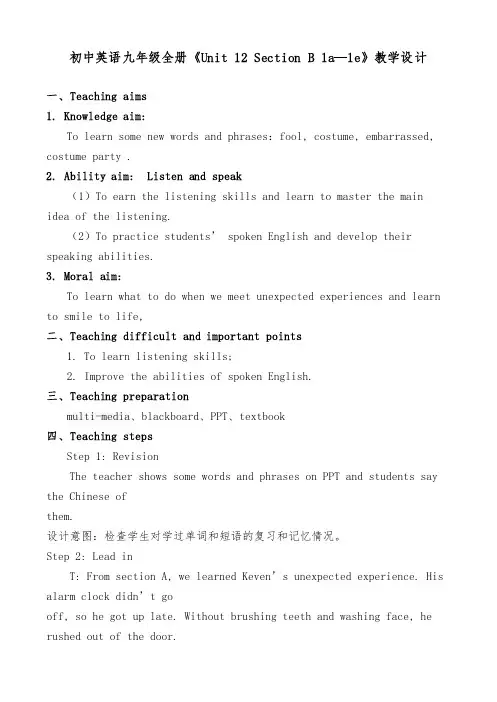
初中英语九年级全册《Unit 12 Section B 1a—1e》教学设计一、Teaching aims1. Knowledge aim:To learn some new words and phrases:fool, costume, embarrassed, costume party .2. Ability aim: Listen and speak(1)To earn the listening skills and learn to master the main idea of the listening.(2)To practice students’ spoken English and develop their speaking abilities.3. Moral aim:To learn what to do when we meet unexpected experiences and learn to smile to life,二、Teaching difficult and important points1. To learn listening skills;2. Improve the abilities of spoken English.三、Teaching preparationmulti-media、blackboard、PPT、textbook四、Teaching stepsStep 1: RevisionThe teacher shows some words and phrases on PPT and students say the Chinese ofthem.设计意图:检查学生对学过单词和短语的复习和记忆情况。
Step 2: Lead inT: From section A, we learned Keven’s unexpected experience. His alarm clock didn’t gooff, so he got up late. Without brushing teeth and washing face, he rushed out of the door.But when he arrived at the bus stop, the school bus has already left. How about others’unexpected experiences? Let’s learn together today.设计意图:导入新课。
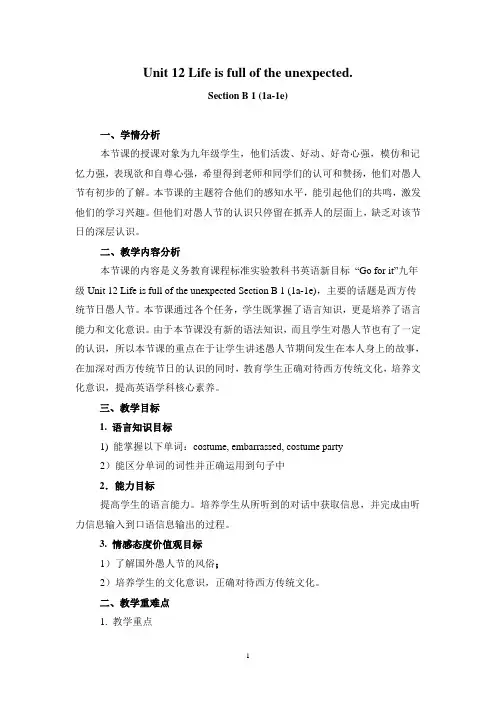
Unit 12 Life is full of the unexpected.Section B 1 (1a-1e)一、学情分析本节课的授课对象为九年级学生,他们活泼、好动、好奇心强,模仿和记忆力强,表现欲和自尊心强,希望得到老师和同学们的认可和赞扬,他们对愚人节有初步的了解。
本节课的主题符合他们的感知水平,能引起他们的共鸣,激发他们的学习兴趣。
但他们对愚人节的认识只停留在抓弄人的层面上,缺乏对该节日的深层认识。
二、教学内容分析本节课的内容是义务教育课程标准实验教科书英语新目标“Go for it”九年级Unit 12 Life is full of the unexpected Section B 1 (1a-1e),主要的话题是西方传统节日愚人节。
本节课通过各个任务,学生既掌握了语言知识,更是培养了语言能力和文化意识。
由于本节课没有新的语法知识,而且学生对愚人节也有了一定的认识,所以本节课的重点在于让学生讲述愚人节期间发生在本人身上的故事,在加深对西方传统节日的认识的同时,教育学生正确对待西方传统文化,培养文化意识,提高英语学科核心素养。
三、教学目标1. 语言知识目标1) 能掌握以下单词:costume, embarrassed, costume party2)能区分单词的词性并正确运用到句子中2.能力目标提高学生的语言能力。
培养学生从所听到的对话中获取信息,并完成由听力信息输入到口语信息输出的过程。
3. 情感态度价值观目标1)了解国外愚人节的风俗;2)培养学生的文化意识,正确对待西方传统文化。
二、教学重难点1. 教学重点1)运用所听到的内容介绍各人所发生的故事2)介绍自己在愚人节愚弄或被愚弄的真实故事2. 教学难点由听力信息输入到口语信息输出,提高学生的语言能力,从而培养学生的文化意识三、教学过程Warming- upDaily greeting.Pre-taskTask1: Free talkLet’s see a video first(愚人节数学老师的恶作剧)1. Have you ever heard of April Fool’s Day?2. Have you ever fooled or been fooled ?Task 2: RevisionLet’s talk something about April Fool’s Day.While-taskTask 1: Finding their homesPut these words in the correct columns in the chart. Some words can go in more than one column.Task 2: Telling your own storyTell your partner something that happened to you recently. Use two or more words in 1a.For example :Last Friday, my friend invited me to his birthday party…..Task 3: Listening1. Dave, Nick and Joe are talking about April Fool ’s Day. Listen and write each person’s name under the correct picture.a: No name b: Joe c: Nick d: Dave .2. Listen again. Who says each of the phrases below? Write D for Dave, N for Nick and J for Joe.1) ______ a costume party2) ______ my alarm went off3) ______ stayed up all night4) ______ was tired5) ______ was really embarrassed6) ______ the other kids showed upKeys: D N J J D N3. Listen again and complete the blanks.Task 4: Group workListen again. Tell April Fool’s Day stories about Dave, nick and Joe in your group.Post-task Telling my own storyHave you ever played jokes on others, especially on Aril Fool’s Day? Have you ever been fooled by others? Tell your story to your partner.SummaryHow to treat April Fool ’s Day correctly?Today we have learned something about April Fool ’s Day. On April Fool ’s Day,we do all kinds of activities for fun. It has become more and more popular with the young people in China. But you must remember that different people have different sense of identity to culture. So before you play tricks on others, you must be careful. Or you will change happy things into bad ones.HomeworkAsk your family if they have fooled or been fooled in their daily life, write a story and share it with your classmates.。
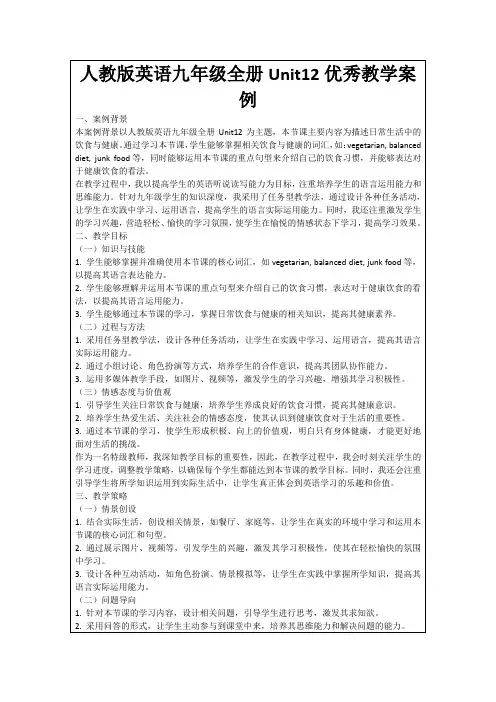
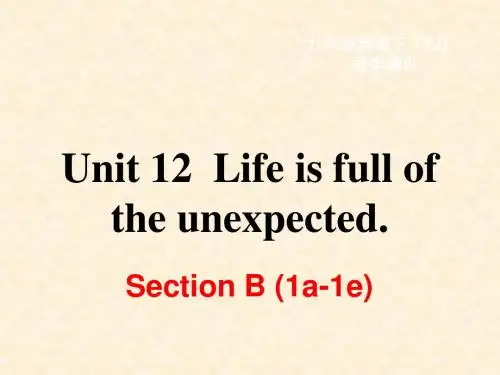
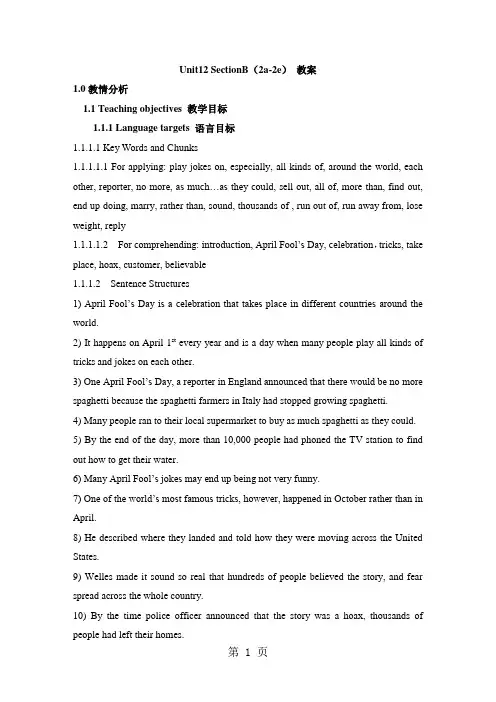
Unit12 SectionB(2a-2e)教案1.0教情分析1.1 Teaching objectives 教学目标1.1.1 Language targets 语言目标1.1.1.1 Key Words and Chunks1.1.1.1.1 For applying: play jokes on, especially, all kinds of, around the world, each other, reporter, no more, as much…as they cou ld, sell out, all of, more than, find out, end up doing, marry, rather than, sound, thousands of , run out of, run away from, lose weight, reply1.1.1.1.2 For comprehending: introduction, April Fool’s Day, celebration,tricks, take place, hoax, customer, believable1.1.1.2 Sentence Structures1) April Fool’s Day is a celebration that takes place in different countries around the world.2) It happens on April 1st every year and is a day when many people play all kinds of tricks and jokes on each other.3) One April Fool’s Day, a reporter in England announced that there would be no more spaghetti because the spaghetti farmers in Italy had stopped growing spaghetti.4) Many people ran to their local supermarket to buy as much spaghetti as they could.5) By the end of the day, more than 10,000 people had phoned the TV station to find out how to get their water.6) Many April Fool’s jokes may end up being not very funny.7) One of the world’s most famous tricks, however, happened in October rather than in April.8) He described where they landed and told how they were moving across the United States.9) Welles made it sound so real that hundreds of people believed the story, and fear spread across the whole country.10) By the time police officer announced that the story was a hoax, thousands of people had left their homes.1.1.1.3 Grammar Focus1) April Fool’s Day is a celebration that takes place in different countries around the world. (a celebration that takes place in different countries around the world是一个定语从句,先行词是that,意思为愚人节是一个在世界各个不同国家都庆祝的活动。
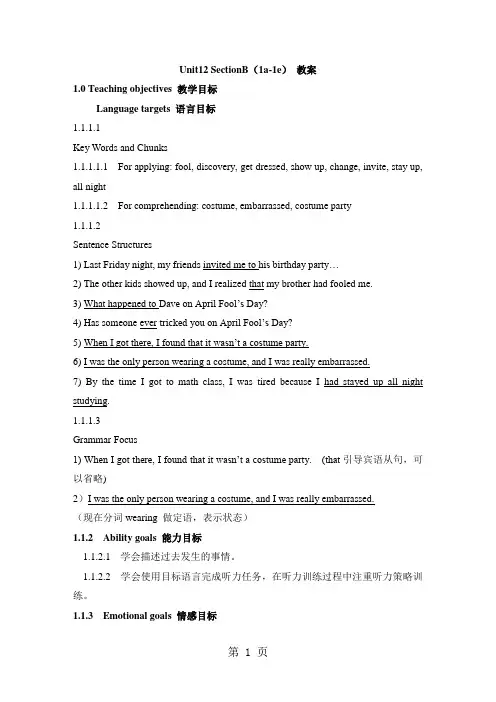
Unit12 SectionB(1a-1e)教案1.0 Teaching objectives 教学目标Language targets 语言目标1.1.1.1Key Words and Chunks1.1.1.1.1 For applying: fool, discovery, get dressed, show up, change, invite, stay up, all night1.1.1.1.2 For comprehending: costume, embarrassed, costume party1.1.1.2Sentence Structures1) Last Friday night, my friends invited me to his birthday party…2) The other kids showed up, and I realized that my brother had fooled me.3) What happened to Dave on April Fool’s Day?4) Has someone ever tricked you on April Fool’s Day?5) When I got there, I found that it wasn’t a costume party.6) I was the only person wearing a costume, and I was really embarrassed.7) By the time I got to math class, I was tired because I had stayed up all night studying.1.1.1.3Grammar Focus1) When I got there, I found that it wasn’t a costume party. (that引导宾语从句,可以省略)2)I was the only person wearing a costume, and I was really embarrassed.(现在分词wearing 做定语,表示状态)1.1.2 Ability goals 能力目标1.1.2.1 学会描述过去发生的事情。
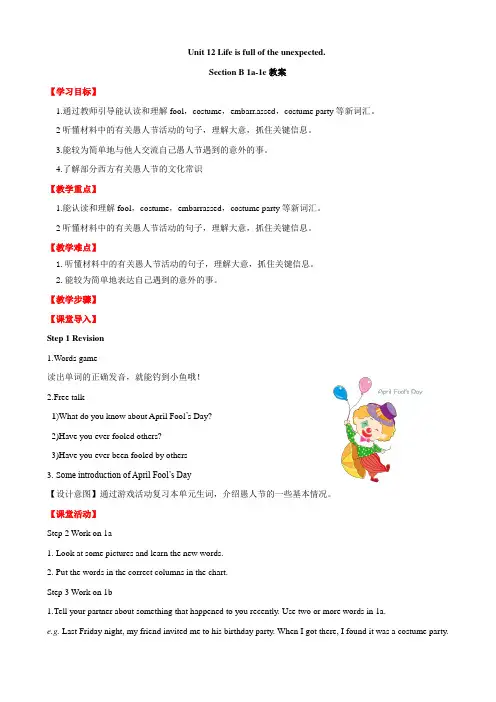
Unit 12Life is full of the unexpected.Section B 1a-1e教案【学习目标】1.通过教师引导能认读和理解fool,costume,embarr assed,costume party等新词汇。
2听懂材料中的有关愚人节活动的句子,理解大意,抓住关键信息。
3.能较为简单地与他人交流自己愚人节遇到的意外的事。
4.了解部分西方有关愚人节的文化常识【教学重点】1.能认读和理解fool,costume,embarrassed,costume party等新词汇。
2听懂材料中的有关愚人节活动的句子,理解大意,抓住关键信息。
【教学难点】1.听懂材料中的有关愚人节活动的句子,理解大意,抓住关键信息。
2.能较为简单地表达自己遇到的意外的事。
【教学步骤】【课堂导入】Step 1 Revision1.Words game读出单词的正确发音,就能钓到小鱼哦!2.Free talk1)What do you know about April Fool’s Day?2)Have you ever fooled others?3)Have you ever been fooled by others3. S ome introduction of April Fool’s Day【设计意图】通过游戏活动复习本单元生词,介绍愚人节的一些基本情况。
【课堂活动】Step 2 Work on 1a1. Look at some pictures and learn the new words.2. Put the words in the correct columns in the chart.Step 3 Work on 1b1.Tell your partner about something that happened to you recently. Use two or more words in 1a.e.g. Last Friday night, my friend invited me to his birthday party. When I got there, I found it was a costume party.I was the only person who wasn’t wearing a costume. I was really embarrassed.【设计意图】用图片教授新单词,学生能够直观形象地感知。
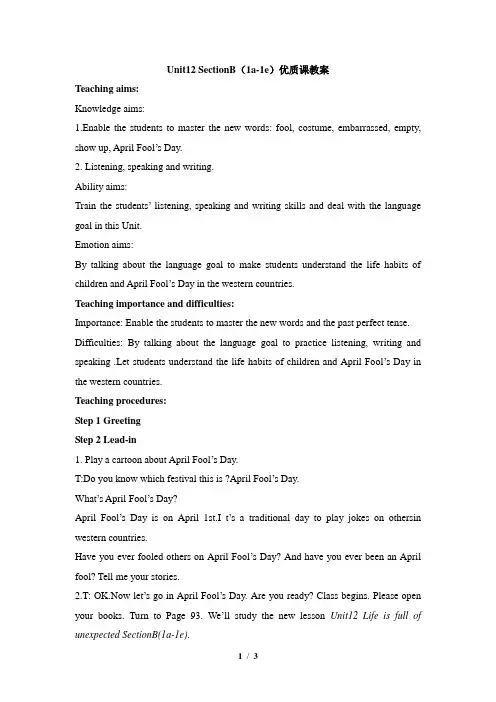
Unit12 SectionB(1a-1e)优质课教案Teaching aims:Knowledge aims:1.Enable the students to master the new words: fool, costume, embarrassed, empty, show up, April Fool’s Day.2. Listening, speaking and writing.Ability aims:Train the students’ listening, speaking and writing skills and deal with the language goal in this Unit.Emotion aims:By talking about the language goal to make students understand the life habits of children and April Fool’s Day in the western countries.Teaching importance and difficulties:Importance: Enable the students to master the new words and the past perfect tense. Difficulties: By talking about the language goal to practice listening, writing and speaking .Let students understand the life habits of children and April Fool’s Day in the western countries.Teaching procedures:Step 1 GreetingStep 2 Lead-in1. Play a cartoon about April Fool’s Day.T:Do you know which festival this is ?April Fool’s Day.What’s April Fool’s Day?April Fool’s Day is on April 1st.I t’s a traditional day to play jokes on othersin western countries.Have you ever fooled others on April Fool’s Day? And have you ever been an April fool? Tell me your stories.2.T: OK.Now let’s go in April Fool’s Day. Are you ready? Class begins. Please open your books. Turn to Page 93. We’ll study the new lesson Unit12 Life is full of unexpected SectionB(1a-1e).Step 3 Pre-listeningLook and guess. Look at the pictures in 1c and guess what happened. Ask the Ss to imagine what happened with the words and phrases in 1a. Look at the picture d. Can you guess some information from the picture? Fill in the blanks.T:(Picture d引着学生说)I guess the boy went to the costume party, because he wore a costume, but he was embarrassed, he was the only one wearing a costume. When he got there, he found that his friend had fooled him.T:(Picture c引着学生说) Next, the boy went to school early, because the school was empty. Maybe he realized that someone had fooled him and had changed the clock earlier.T:(Picture b引着学生说) Next, he was very tired because he had stayed up all night studying.T:(Picture a引着学生说) Next, The boy was very scared, because he thought he had met monster.Is this a real monster?(学生回答No.) It’s a costume, a monster suit.Step 4 Listening1.T: I’ll play the tape for you. The first time, only listen for the general idea. After listening, ask what the conversation is about.2. T: Listen again and finish 1c and 1d. Let’s look at the pictures.(同时呈现四幅图) T: They are Joe, Nick and Dave. They are talking about April Fool’s Day. Do you want to know who they are in each picture? Listen and match. What are they talking about? Listen and match.3.T: OK. Listen and check.4. T: Are you ready? Who’d like to show your answer? Are these all right?5. T: Do you want to know more information about them? Listen again and fill in the chart below.6. T: Read the conversations on P146 and listen to the tape, repeat and pay attention to your pronunciation and intonation.7. T: Please look at the chart. Let’s retell like this: On April Fool’s Day, …T: 2 minutes for you. Are you ready? Who’d like to share?Step 5 ACTAsk the Ss to practice the three boy s’ stories in a group. Then ask some groups to act the stories.Step 6 Summary:T: You are great. People often play jokes on April Fool ‘s Day for fun. But we must know some taboos.Do you know any taboos? Let the Ss say something. Then let’s sum up for this class. What did we learn?➢Key words &phrases:fool, costume, embarrassed, costume party➢Key sentences:1. What happened to Dave on April Fool’s Day?2. Well, a friend invited him to a costume party…3. I realized that my friend had fooled me.Step 7 Homework.1. Review the conversations in 1c.2. Preview the new words and expressions in the article in SectionB.3. Do the exercises in students’ book.。
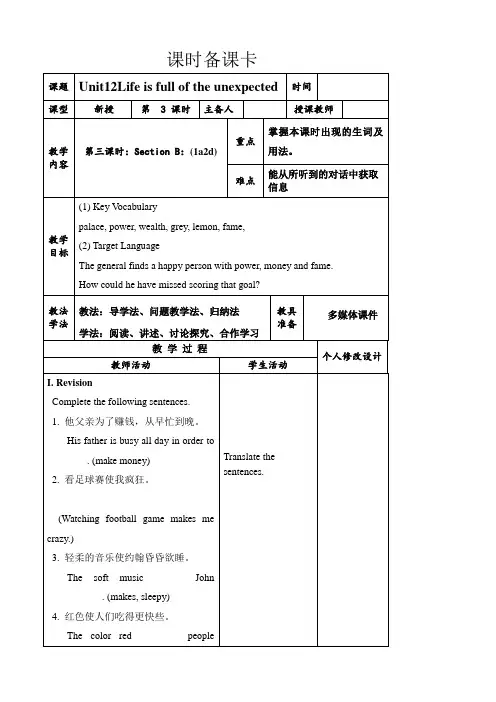


Unit12 Life is full of the UnexpectedSection B ( 1a~1e)一、课型:听说课二、教学资源分析本单元以意外事件为话题,以陈述过去的事件为交际功能,重点在语境中学习和运用过去完成时,同时复习时间状语从句。
本课讲的是Section B ( 1a~1e)有关愚人节的听说板块,就别人的恶作剧和愚人节进行讨论,来激活关于愚人节的词汇、句型,帮助学生学会运用听力策略去听读课文、理解课文,并且在听、说的过程中达到语言输出的目的。
三、学情分析九年级是整个初中阶段的重要一年面临中考的升学压力。
学生在心理上、学习上各方面都发生了很大变化,学生差异会出现明显的分化,因而在教学面向全体学生的基础上更要注重分层教学,充分调动每个学生学习英语的积极性。
同时,九年级学生有升学的迫切需求,学习目的目的性明确,好奇心强,可以充分利用他们的特点,设置不同层次的“任务”的形式组织教学活动,让学生通过“用语言做事情”来学习和使用英语。
同时,运用活动教学法,让学生在活动中自主地完成任务,从而提高学生自主解决问题的能力和语言的综合运用能力,进而提高英语成绩。
四、教学目标:知识目标:1、能够掌握重点词汇和短语:fool, costume, realize, call, embarrassed, empty, tired, show up, stay up, go off, get dressed…2、能够掌握重点句型:I had stayed up all night studying;I found out that my friend had fooled me;I felt embarrassed/ unhappy…3、能力目标:1、教会学生听前预测,听关键词等听力策略,提高学生的听力能力。
2、通过学习有关愚人节活动的表达方式让学生们可以在情境中运用所学讲述过去发生的事情,提高学生的语言交际能力。
Unit12 SectionB〔1a-2e〕精品教案一、教学目标:1. 语言知识目标:1) 能掌握以下单词:fool, costume, embarrassed, costume party, announce, spaghetti, hoax, sell out, discovery, lady, cancel, officer, believable, disappear, embarrassing2) 能掌握以下重难点句子:3) 提高学生的听力技能。
培养学生从所听到的对话中获取信息的能力。
4〕培养学生的阅读能力,理解关键词和短语的能力。
2. 情感态度价值观目标:1〕了解局部西方节日的文化常识。
2〕了解不及时做某事而造成的危害,培养学生养成良好的行为习惯。
二、教学重难点1. 教学重点:根据所学词组写一篇短文。
2. 教学难点三、教学过程Ⅰ. Warming- up and revision1. Daily greeting.2. Exercise根据对话内容,从方框内选择适宜的句子补全对话。
〔有两项多余)A: Can I ask you some questions, Lisa?B: Sure.A: (1) _________B: Yes, I have. But only once last term.A: (2) _________B: I stayed up watching the football match the evening before, so I overslept the next morning.A: What did you do after you got up?B: (3) _________ But unfortunately, by the time I got there, the bus had already left. A: Poor guy! And then?B: So I started walking. Luckily, my uncle drove by and gave me a ride.A: But you didn’t make it in the end, did you?B: No, I didn’t. (4) _________A: What did your teacher say?B: (5) _________A: Yes, he is right. Thanks for your answering.B: It’s my pleasure.Keys: 1—5 D A F G EⅡ. Lead in1. Finish 1a. Put these words in the correct columns in the chart. Some words can go in more than one column.fool invitecostume embarrassedgo off callget dressed emptyshow up realizechange clocktired stayupNouns(people, place, things) Verbs(action words)Adjectives(descriptionwords)2. Tell Ss nouns are probably about people, things, places. Verbs are about action words. Description words are probably adjectives.3. Work on 1a.4. Share the answers with others in class.5. Ask Ss make sentences with the words in 1a.Keys: fool costume change clockfool invite go off get dressed show up realize changestay upembarrassed tired emptyExercises:Fill in the blanks with the correct forms of the words or phrases.1.I was waiting for the school bus but it didn’t come. Then I ________ it wasSaturday.2.I woke up late this morning. I had to really ______ to get to school on time.3.There’s a good TV show tonight but it’s at 1:00 am. I don’t want to _________that late.4.Sally _______ me to her birthday party. It’s at her house on Saturday.5.Do you know where John is? He was going to meet me earlier but he didn’t_________.1. realized2. rush3. stay up4. invited5. show upIII. Work in pairs.1b Tell your partner something that happened to you recently. Use two or more words in 1a.Last Friday, my friend invited me to his birthday party…..Ⅳ. PresentationAsk the students what they know about April Fool’s Day.What did you do on Last April Fool’s Day?BBC——飞翔的企鹅2021年,BBC摄制组在南极附近拍摄了自然历史系列?进化的奇迹?〔Miracles of Evolution〕。
Unit12 SectionB(1a-1e)教案1.0 Teaching objectives 教学目标Language targets 语言目标1.1.1.1Key Words and Chunks1.1.1.1.1 For applying: fool, discovery, get dressed, show up, change, invite, stay up,all night1.1.1.1.2 For comprehending: costume, embarrassed, costume party1.1.1.2Sentence Structures1) Last Friday night, my friends invited me to his birthday party…2) The other kids showed up, and I realized that my brother had fooled me.3) What happened to Dave on April Fool's Day?4) Has someone ever tricked you on April Fool's Day?5) When I got there, I found that it wasn't a costume party.6) I was the only person wearing a costume, and I was really embarrassed.7) By the time I got to math class, I was tired because I had stayed up all night studying.1.1.1.3Grammar Focus1) When I got there, I found that it wasn't a costume party. (that引导宾语从句,可以省略)2)I was the only person wearing a costume, and I was really embarrassed.(现在分词wearing 做定语,表示状态)1.1.2 Ability goals 能力目标1.1.2.1 学会描述过去发生的事情。
1.1.2.2 学会使用目标语言完成听力任务,在听力训练过程中注重听力策略训练。
1.1.3 Emotional goals 情感目标页 1 第1.1.3.1学会自我反思,正视生活中的困难。
1.1.3.2 学会树立勇气,勇敢面对生活中的意想不到的问题。
1.2 Important and difficult teaching points 教学重难点1.2.1掌握过去的事情表达方式,并能理解听力中的相关表达。
1.2.3 运用这些表达进行口语输出性练习。
2.0 Student analysis学情分析2.1 Fundamental State基本情况通过Section A的学习,学生已经能积极交流表达自己或者其他人过去发生的事情。
从学习态度来说,学生已经意识到生活不是一帆风顺的,遇到困难或者意外在所难免,需要提高信心与勇气。
Section B的内容从学生的生活琐事、意外事故过渡到生活中出其不意的玩笑,特别是愚人节发生的让人难以预料的事情。
2.2 Knowledge Reserve知识储备通过Section A的学习,学生熟练掌握了“had +动词过去分词形式”来表达过去的过去发生的事情,为Section B第一课时引导学生讲述愚人节中发生的事情和相关话题进行了语言积累和话题预热,同时也从学生的生活琐事、意外事故过渡到生活中出其不意的玩笑,特别是愚人节发生的让人难以预料的事情。
2.3 Class data本班实际通过Section A的学习,因为本班学生属于中等层次的水平,学生都有很大的提升空间,乐于通过用过去完成时态陈述自己过去的经历。
本课时围绕愚人节进一步讲述在愚人节这个西方节日中学生的个人经历。
教师应该抓住契机,引导学生养成正确面对别人的捉弄和勇敢面对的心态。
3.0 Teaching methods教法建议3.1 Communicative approach交际法3.2 Question and answer method问答法3.3 Exercise method练习法4.0 教学辅助blackboard and chalk, computer , PPT, tape recorder5.0 Teaching procedures 教学进程5.1 Leading-in and warming-up 引入与激趣活动5.1.1 Discussion页 2 第Before Ss open their book, T can show some pictures of April Foll's Day and guide students to think about what they do on April Fool's Day.T can also introduce different custom about April Fool's Day as well as the culture itself.5.2 New points input 新知输入(贴标签)5.2.1 Activity 1a-1bT can tell a story: yesterday, my friends invited me to a costume party. I dressed up likeSnow White. I sang and danced with my friends at the party. Then, T guide Ss guess the meaning of costume.Revise part of speech. T may tell Ss that some words can go in more than one part of speech. Take fool for example, it can not only be a noun but also be a verb.Get some Ss to tell their answers and make sure they know the requirements and put into the right colum.Check the answers.T asks several groups of students to tell something that happened to them recently by using the words and phrases in 1a.5.3 Listening practice 听力训练5.3.1 Pre-listening 听前指导Guide Ss to make a prediction before listening by looking at the picture on page 93 andasking what they were doing and how they felt.5.3.2 While-listening 听中任务Activity 1cGuide Ss to listen for the learning challenges and write each person's name under the correct picture. Tell them to pay more attention to listening instead of writing.The answers:a- Dave, b- Joe, c- Nick, d- DaveActivity 1dGuide Ss to listen for details, pay more attention to the person who says each of the phrases. Guide Ss to write the short abbrieation instead of full name, (e.g. D- Dave) The answers:页 3 第1. D2. N3. J4. J5. D6. N5.3.2 Post-listening 听后任务Play the recording and get Ss to read after recording.5.4 Oral output口语输出Activity 1e5.4.1 Get Ss to work in pairs, use the information you hear in the conversation and practice the conversation several times.5.4.2 Get several pairs to come to the front and role play the conversation without looking at their books.5.5 Sentence interpretation 难句理解5.5.1When I got there, I found that it wasn't a costume party.when引导的时间状语从句,that在本句中引导宾语从句,可省略。
5.5.2We didn't have a test at all!not…at all 表示一点也不,是全部否定。
5.6 Sentence applying 好句运用5.6.1 When I got there, I found that it wasn't a costume party. P146【原句翻译】当我到那儿的时候,我发现它不是一个化妆舞会。
_____________________________________________________________________ 【仿写造句】When…,I found that …__________________________________________________________________ 5.6.2 We didn't have a test at all! P146【原句翻译】我们根本就没有考试!_____________________________________________________________________ 【仿写造句】not…at all__________________________________________________________________5.7 Summary页 4 第Help Ss to make a summary by talking and sharing in groups. T may ask questions like:Q1:What have you learnt in this period?Q2: What do you still have problem with?Q3: How will you work out the problems?Get the Group leader (GL) to share their summary. Put some key points on the Bd to form a clear mind map.6.0 Homework 课后作业After class, T can give a topic to Ss and have a group discussion about:What happened to you on last April Fool's Day? How did you feel?Next class, Ss can share their ideas with each other.页 5 第。